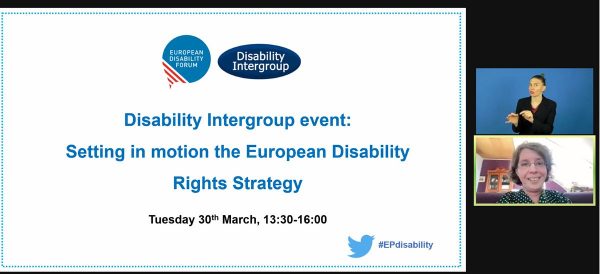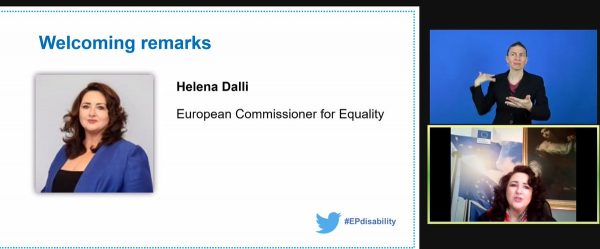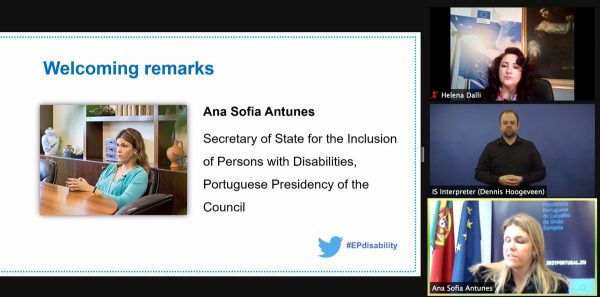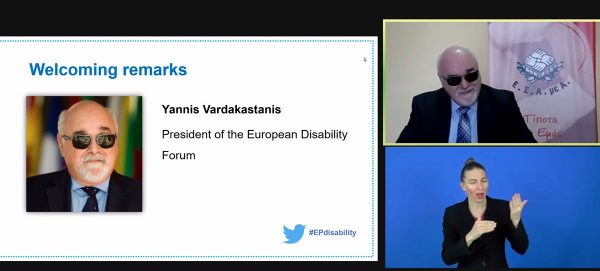On 30th March 2021, the Disability Intergroup hosted the webinar: “Setting in Motion the European Disability Rights Strategy”. The aim of this public event was for members of the Disability Intergroup, and EDF members to express their opinion about the recently launched European Disability Rights Strategy 2021-2030, and discuss how to work together to succeed in its implementation.
MEP Katrin Langensiepen, co-chair of the Disability Intergroup, gave the introductory remarks and expressed desire for a stronger Disability Strategy with clearer set deadlines and targets. European Commissioner for Equality Helena Dalli stated her positive views on the development of the Strategy and offered assurances of an effective implementation of its components.
Ana Sofia Antunes, Secretary of State for the Inclusion of Persons with Disabilities, Portuguese Presidency of the Council stressed the importance of consulting with representative organisations of persons with disabilities. And EDF President Yannis Vardakastanis concluded the opening session reminding the participants that the Strategy alone will not bring any change to the lives of 100 million persons with disabilities. “The ambition, the political will, the resources, and the implementation and monitoring of its actions in collaboration with organisations representing persons with disabilities, are the necessary elements to make policies and new realities emerge from this piece of paper”, he stated.
In a brief Technical Session, featuring a presentation from Inmaculada Placencia Porrero, Senior Expert of the European Commission DG Employment, Social Affairs and Inclusion, the main actions of the Strategy were highlighted. She underlined the development of the AccessibleEU resource center, as well as the European Disability Card, as two of the key flagship initiatives of the Strategy. She also elaborated on the Commission efforts to ensure the right to life, independent living, and promote civil engagement for persons with disabilities at the Member States level.
MEPs Alex Agius Saliba and Dragos Pislaru led the discussion of three of the chapters of the Strategy: “accessibility”, “enjoying EU rights”, and “equal access and non-discrimination”. MEP Agius Saliba discussed the need of non-discrimination directives across the EU, emphasizing a harmonized EU policy initiative that promotes accessibility, awareness, and inclusion and the need for set CRPD focal points to support these measures. MEP Pislaru made statements regarding the importance of diversity and equality within EU policy, further elaborating on demands for inclusive accessibility for persons with disabilities within the EU in areas such as justice, education, healthcare, and social environments. He also provided testimony from Romanian constituents regarding the effectiveness of disability legislation on the local level.
During the discussion, MEP Sylvia Spurek spoke on the necessity to include women and gender-based discrimination within the Disability Strategy and in future disability legislation.
MEPs Stelios Kympouropoulos, Jose Gusmao, and Monica Silvana Gonzalez led the discussion for the second section on the Strategy chapters “decent quality of life and living independently” and “promoting the rights of persons with disabilities globally”. MEP Kympouropoulos expressed the need to expand policies that enable persons with disabilities to have independent living and economic engagement. MEP Gusmao echoed this claim but also stated the fact that EU funding still is based on institutionalization instead of community-based services and is largely unmonitored and that more work must be done to properly promote inclusion into the labor market.
MEP Silvana Gonzalez further pointed out aspects of the Strategy that were missing, specifically further measures to encourage persons with disabilities to engage in democratic structures and the fight against climate change. Besides, MEP Josianne Cutajar emphasized the need to for access to education and skills for persons with disabilities, as well as the benefits of smart homes for independent living.
MEP Radka Maxova and MEP Katrin Langensiepen led the third and final discussion block on “efficiently delivering the strategy”, “leading by example”, and “awareness, governance, and measuring progress”. MEP Maxova called for a more ambitious approach from the Commission in establishing CRPD focal points, recommending an increased integration of these focal points into EU policy frameworks. Moreover, MEP Langensiepen once again emphasized the importance of the UN Convention on the Rights of Persons with Disabilities, and the need for clear targets and progress measuring, as well as the need to properly finance the Disability Rights Strategy and raise awareness on issues concerning disability rights.
Concluding remarks were given by MEP Maxova, which emphasized the importance of the European Disability Rights Strategy in progressing the rights of persons with disabilities within the EU, and bringing EU policy more in line with the UN CRPD. She also stressed the need to continue advocating to ensure that these new measures are properly implemented both at the EU level and in the Member States.
The webinar included a brief Q&A session between participants and the MEPs and Commission representatives.
Contact:
Alejandro Moledo – Policy Coordinator
alejandro.moledo@edf-feph.org
Twitter: @alexmoledo
Photos of the event



